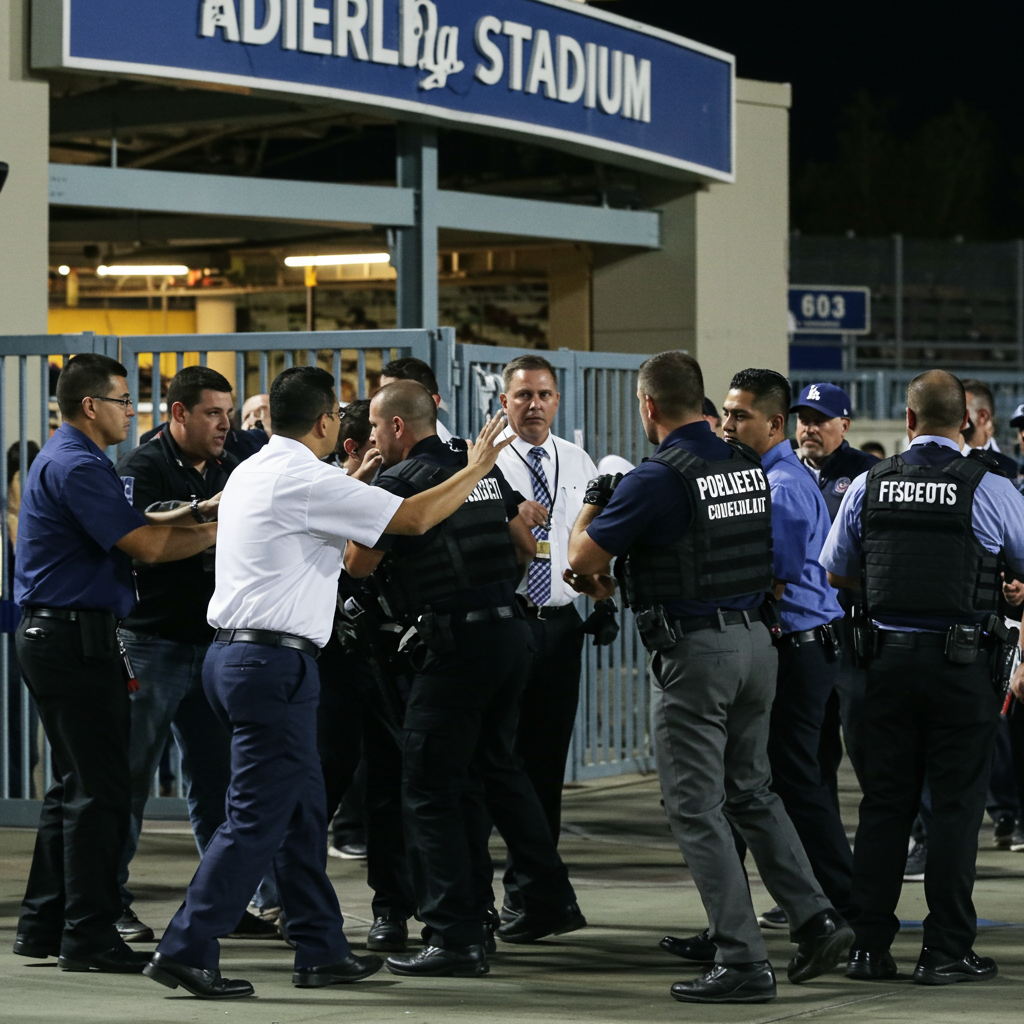LA Dodgers Block Federal Agents From Stadium Amid Raids
In a striking development amidst heightened immigration enforcement across Los Angeles, the Los Angeles Dodgers organization denied entry to federal agents who were reportedly attempting to use the stadium grounds as a staging area. The incident highlights rising tensions between federal operations, local officials, and community sentiment in the city.
Reports emerged that dozens of federal agents, many clad in tactical gear and with faces obscured, were seen gathering near Dodger Stadium. Eyewitness accounts and images circulating on social media showed numerous federal vehicles and personnel outside the venue’s entrances.
Los Angeles City Council members, alerted by concerned constituents, contacted the Los Angeles Police Department, who in turn notified the Dodgers organization about the presence of the agents near their private property.
The Dodgers organization confirmed the interaction in a statement, asserting they had refused the agents access. “This morning, ICE agents came to Dodger Stadium and requested permission to access the parking lots,” the team stated. “They were denied entry to the grounds by the organization. Tonight’s game will be played as scheduled.”
However, official accounts from federal agencies offered conflicting narratives. U.S. Immigration and Customs Enforcement (ICE) initially responded via social media simply stating, “False. We were never there.” The Department of Homeland Security (DHS) provided a slightly different explanation, claiming that Customs and Border Protection (CBP) vehicles were in the stadium parking lot “very briefly” and their presence was “unrelated to any operation or enforcement activity.” Sources familiar with the situation did confirm federal agents were turned away from the gates after requesting entry.
Amidst LA Raids: The Broader Context
The appearance of federal agents near the stadium occurred against a backdrop of intensified ICE raids throughout Los Angeles. These operations, reportedly part of a directive from President Donald Trump for expanded deportation efforts in major cities, have sparked widespread protests across the city and nationwide.
On the day of the stadium incident, anti-ICE protesters were present near the venue, holding signs and chanting slogans like “ICE out of L.A.” and “ICE go home.” Community advocates had previously criticized the Dodgers organization for remaining largely silent on the immigration raids impacting local communities. Raul Claros of California Rising was quoted pointing towards the stadium, saying, “The largest economic engine in this area is silent! Wake up! Do better! We know you can!” The stadium incident followed reports of other simultaneous raids in the city, including one near a Home Depot.
The President had also mobilized federalized National Guard troops and U.S. Marines to the city, against the wishes of California’s Governor Gavin Newsom, in an effort to suppress protests. Mayor Karen Bass noted that crime prevention efforts and curfews had helped reduce violent encounters between federal agents and protesters in some areas.
Pressure Mounts: Dodgers Respond?
While the Dodgers had faced criticism for their public silence, the decision to deny federal agents access to their property is seen by some as a potential shift or signal from the organization. GOP strategist Mike Madrid suggested that those who criticized the team’s earlier stance might have been premature, calling the denial a “big move by a major organization.”
Reports from the Los Angeles Times indicate the Dodgers organization is planning to announce significant initiatives aimed at supporting immigrant communities impacted by the recent enforcement actions.
The organization has recently navigated other moments highlighting immigration issues. Days before the stadium incident, singer Nezza sang the National Anthem in Spanish at a game, reportedly despite a request to perform in English, stating it was “Para mi gente” (For my people). While she initially expressed concern about repercussions, the Dodgers later stated there were “no hard feelings.” Dodgers star player Kike Hernández also released a statement earlier in the week expressing he was “saddened and infuriated” by the situation and stating that all people deserve respect and human rights.
Interestingly, conservative sports writer Clay Travis had previously suggested on Fox News, in response to Nezza’s anthem, that it would be “amazing” if an ICE raid occurred in the Dodger Stadium parking lot.
Deeper Issues: ICE Operations Face Scrutiny
The incident at Dodger Stadium also brings into focus broader criticisms and controversies surrounding the tactics and transparency of federal immigration enforcement agencies under the current administration.
Reports noted many agents near the stadium were masked, a tactic ICE has claimed is necessary for agent safety due to an alleged increase in assaults and risk of doxing. However, data analysis has challenged the severity of the claimed assault increase, and ICE has reportedly failed to provide evidence of agents being doxxed or targeted outside of arrest contexts. Critics argue officers covering their faces serves primarily to avoid accountability and hinder identification.
Furthermore, federal agencies like ICE have faced scrutiny for appearing to resist congressional oversight. Despite federal law permitting sitting members of Congress to visit facilities housing “aliens” without prior notice, new DHS rules require 72 hours’ notice and grant the agency broad authority to deny or reschedule visits for vaguely defined “operational concerns.” Several Democratic members of Congress have reported being denied entry during attempted oversight visits to ICE facilities in various states. In one notable instance, a New Jersey mayor attempting to accompany representatives on a visit was arrested, and a congresswoman was later charged, prompting accusations that such actions are “purely political” and designed to deter legislative oversight.
The Dodgers’ decision to deny federal agents access to their private property stands as a high-profile local action amidst these complex national dynamics of immigration enforcement, community protests, and scrutiny of federal agency practices.



